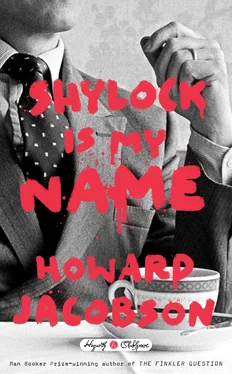Strulovitch was of a mind to say that however exhaustive Shylock’s answer, it wasn’t exactly an answer to the question he had asked; in fact to the two questions he had asked: had Antonio’s privy parts been the original site of the compact and, if so, how had Shylock negotiated the actual and moral distance from those to Antonio’s heart.
Shylock registered his companion’s dissatisfaction. “You want an explanation for what cannot be explained,” he said. “Did I know what I wanted in full earnest? Had I formed a definite scheme for what I would do in the event of Antonio defaulting that answered truly to some heartfelt wish — you must ask yourself what would I have wanted with Antonio’s privy parts? — or was I threatening to exact, for the fun of it, or because I had no genetic choice but to exact, the very penalty that superstition expects a Jew to exact? Was I acting out my desires or theirs? When you can answer that about yourself you can come knocking on my door again. This, though, I can tell you — if there was salacious jest in the first proposed requital, there was none in the second. And that was my mistake. I ennobled Antonio by showing I had designs, even momentarily — and even if they weren’t first and foremost my designs — upon his heart. The tragedy he had always sought out for himself I nearly gave him — though he was undeserving of so high an office. Attacking his privy parts would, after all, have kept him in his place — a man of high pretension and small merit. I lifted him out of farce.”
—
Strulovitch thought best to leave it, for the time being, at that. People were watching. Though their table was discreetly positioned, Shylock’s voice was loud and his mode of speaking, for the first time in their brief acquaintance, intemperate. Diners lost their temper at Ristorante Treviso, sometimes even walking out on their dinner companions. But it was rare to hear someone say “The villainy you teach me I will execute.”
Besides, a meal was a meal. And they still had progress to make through the wine list.
The real reason Strulovitch chose not to pursue the subject, however, was that he had grown distracted, afraid he had been wrong, first of all not to prevent his daughter leaving the house, and then not to have gone after her. It seemed right at the time to let her go without a fight, in order to show that he was reasonable, and in the hope that he might thereby win her back more easily later. It didn’t seem right any longer. Where was she now?
He still half expected her to turn up with Howsome, laughing brittly, looking beautiful, a little girl pretending to be a woman. It was while he was raking the darkest corners of the restaurant with his anxious stare that he saw D’Anton in the company of a number of younger men. He looked away. D’Anton was not a person he wanted to see at any time, least of all when he was sick with worry. So what was it that kept drawing his attention back? Partly it was the intensity with which D’Anton was scrutinising him. But also it was something not quite right in the composition of his party. Only as they rose to go — hurriedly, it seemed to Strulovitch, as though he might be the cause of it — did he realise what that something not quite right was. It was the presence of Gratan Howsome.
His first thought was to rise from the table brandishing his fists; his second was to stay right where he was. This was a good sign, wasn’t it? Howsome here on his own? Howsome looking the very opposite to jubilant? Surely this could only mean that they had broken up already. That Beatrice had seen sense, given him his marching orders and returned home. He suppressed a third instinct which was to go over and laugh in the footballer’s face before he could leave the restaurant. Why bother if she had left him already? He imagined her waiting up for him when he got back. Sorry, Daddy .
But she wasn’t.
So where, in God’s name — more to the point, where on God’s earth — was she?
D’Anton had not at once sent off his letter to the Jew. Nothing was to be achieved by delaying, except the saving of his soul. It was not in his nature, as it had fortunately not been a necessity of his pocket, to go begging to any man, but to go begging to Strulovitch turned his stomach. Perhaps circumstances would change if he held back. Perhaps Barnaby would hit upon another gift for Plurabelle. Or, with a bit of luck, Strulovitch might suddenly put the Solomon Joseph Solomon back on the market. He called himself a collector, but it was said that he sold at times too, when the market was right, and D’Anton had no reason to doubt the veracity of such rumours. If he’d been told that Strulovitch had charts on his walls showing every smallest rise and fall in the value of art in every city in the world, he would not have been surprised.
D’Anton was not a dilatory man, but he didn’t rush into things either. The advantage of having a melancholy nature was that it found a sort of pleasure in the slow passage of time, and since there was no true happiness to be rewarded with at the end of anything one did, there was no rush to do it.
And then Gratan came to him with a strange request— no, that wasn’t fair, it had not yet assumed the shape of a request, it was more a plaint, an outraged perplexity, as though he felt he had been assaulted but had no bruise to show for it. “I’m in a bit of a pickle,” he told him.
D’Anton often wished he’d been a marrying man and had brought up a family. I would have made a good father, he thought, though when he pictured himself playing in the garden with his children they were all boys. This wasn’t sexual. Boys seemed sadder to him than girls, that was all. Boys nursed a secret hurt. He couldn’t have put a name to it. He had never been able to put a name to his own. When he was a child he watched girls reading and painting and playing with their dolls — all right, with their soldiers too — and he saw in them a capacity for engrossment and self-forgetfulness that was beyond him. He was always alert to himself, not just easily wounded but attentive to those wounds, as though his only playthings were the slights he suffered.
Nothing very much changed as he grew older. Mortifications were still his playthings. But he felt them on behalf of other people now — other people of both sexes, but particularly men. The spectacle of their brave vulnerability, the woundedness which dared never speak its name, because men were meant to be strong not weak, consumed his emotional energies. If he could have made the world a better place for every man he saw in pain he would have done so. But you can spread your altruism only so far, so D’Anton made a double-friend of every friend he had, expending more concern on them than most ever thought they stood in need of. Never mind if they took advantage of him. Indeed the ones who took advantage of him the most were the ones he most helped. For they were surely — else they would not have made such exorbitant demands — the ones in greatest psychological want of his assistance.
Between Gratan and Barnaby in this regard — though obligation shaded into love for the one, while love shaded into obligation to the other — there was not much to choose. Barnaby came from the better family and had been given the better education, but he had no gifts beyond the boyish prettiness which, for D’Anton, was the outward form of his inward loveliness of spirit — a loveliness that needed all the help it could get in a world that didn’t scruple to take advantage of innocence. Gratan had been initiated into cruelties that Barnaby could never have borne, had no education and was not by any stretch of the imagination pretty, but he had abundant physical skills and was able to earn an independent living with his body. On the surface he was not the sort of man who called out D’Anton’s sympathies. But scratch a little deeper and the lonely, sorrowing boy could be discerned. Hence those little acts of folly like the Nazi salute which in reality was no such thing. D’Anton recognised a cry for help when he heard one. And when that cry for help was seconded first by one dear friend, and then another, he had no choice but to count Gratan as one of the deserving. He would, as he told Plurabelle — and as he had proved in the matter of finding him a Jew-girl to play with — do anything in the world for him. The phrase was automatic and denoted nothing in particular. But when Gratan drooped his normally manly head and announced he was in a bit of a pickle, D’Anton knew that the hour for another sacrifice — of his time, his energies, his influence, and maybe even his wallet — was at hand.
Читать дальше












